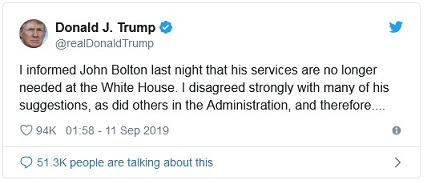
10 Sep 2019; MEMO: US President Donald Trump abruptly fired his national security adviser John Bolton amid disagreements with his hard-line aide over how to handle foreign policy challenges such as North Korea, Iran, Afghanistan, and Russia, reports Reuters.
“I informed John Bolton last night that his services are no longer needed at the White House. I disagreed strongly with many of his suggestions, as did others in the Administration,” Trump tweeted.
Bolton, a leading foreign policy hawk and Trump’s third national security adviser, was widely known to have pressed the president for a harder line on issues such as North Korea. Bolton, a chief architect of Trump’s strident stance against Iran, had also advocated a tougher approach on Russia and Afghanistan.
 The 70-year-old Bolton, who took up the post in April 2018, replacing H.R. McMaster, had sometimes been at odds with Secretary of State Mike Pompeo, one of Trump’s main loyalists.
The 70-year-old Bolton, who took up the post in April 2018, replacing H.R. McMaster, had sometimes been at odds with Secretary of State Mike Pompeo, one of Trump’s main loyalists.
Offering a different version of events than Trump, Bolton tweeted: “I offered to resign last night and President Trump said, “Let’s talk about it tomorrow.”
Trump had sometimes joked about Bolton’s image as a warmonger, reportedly saying in one Oval Office meeting that “John has never seen a war he doesn’t like.”
A source familiar with Trump’s view said Bolton, an inveterate bureaucratic infighter with an abrasive personality, had ruffled a lot of feathers with other key players in the White House, particularly White House chief of staff Mick Mulvaney.
“He doesn’t play by the rules,” the source said. “He’s a kind of a rogue operator.”
During his time at the State Department under the administration of Republican former President George W. Bush, Bolton kept a defused hand grenade on his desk. His 2007 memoir is titled: “Surrender Is Not An Option.”
Trump’s North Korea envoy, Stephen Biegun, is among the names floated as possible successors.
“Biegun much more like Pompeo understands that the president is the president, that he makes the decisions,” said a source close to the White House.
Also considered in the running is Deputy Secretary of State John Sullivan, who had been expected to be named U.S. ambassador to Russia.
White House spokeswoman Stephanie Grisham said, “many, many issues” led to Trump’s decision to ask for Bolton’s resignation. She would not elaborate.
Trump would sometimes chide Bolton about his hawkish ways in meetings, introducing him to visiting foreign leaders by saying:
"You all know the great John Bolton. He’ll bomb you. He’ll take out your whole country."
Officials and a source close to Trump said the president had grown weary of his hawkish tendencies and the bureaucratic battles he got involved with.
Bolton traveled widely in the role and on his travels, for example, he warned Russia against interfering in US elections and promoting strong ties with Israel.
Bolton had spearheaded Trump’s hard-line policy against Iran, including the US abandonment of an international nuclear deal with Tehran and reimposition of US sanctions.
Bolton was widely believed to have favored a planned US airstrike on Iran earlier this year in retaliation for the downing of a US surveillance drone, an action Trump called off at the last minute. Trump has since expressed a willingness to talk to Iranian leaders under the right conditions.
Bolton was an ardent opponent of arms control treaties with Russia. He was instrumental in Trump’s decision to withdraw last month from a 1987 accord that banned intermediate-range missiles because of what Washington charged was Moscow’s deployment of prohibited nuclear-capable cruise missiles, an allegation Russia denied.




